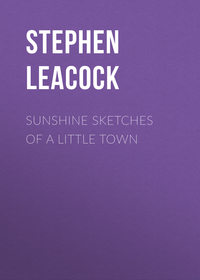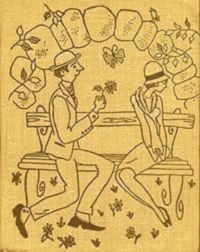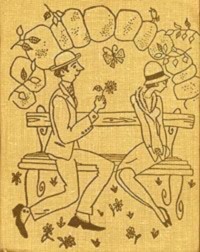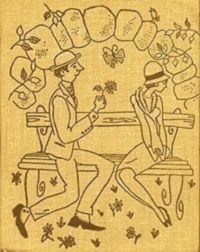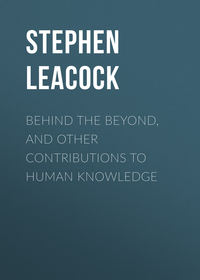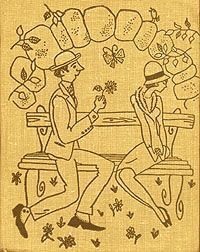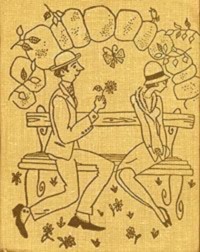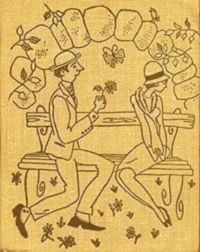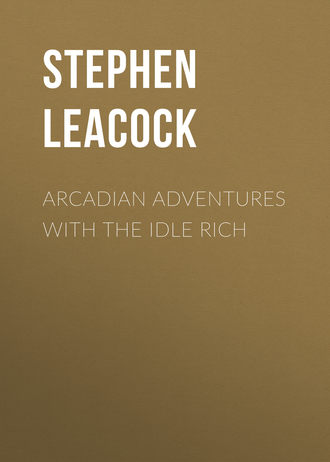 полная версия
полная версияArcadian Adventures with the Idle Rich
This was regarded in business circles as a piece of great shrewdness. "Says his father is buried there, eh? Devilish shrewd that!"
It was so long since any of the members of the Exchange or the Mausoleum Club had wandered into such places as Cahoga County that they did not know that there was nothing strange in what Tomlinson said. His father was buried there, on the farm itself, in a grave overgrown with raspberry bushes, and with a wooden headstone encompassed by a square of cedar rails, and slept as many another pioneer of Cahoga is sleeping.
"Devilish smart idea!" they said; and forthwith half the financial men of the city buried their fathers, or professed to have done so, in likely places—along the prospective right-of-way of a suburban railway, for example; in fact, in any place that marked them out for the joyous resurrection of an expropriation purchase.
Thus the astounding shrewdness of Tomlinson rapidly became a legend, the more so as he turned everything he touched to gold.
They narrated little stories of him in the whiskey-and-soda corners of the Mausoleum Club.
"I put it to him in a casual way," related, for example, Mr. Lucullus Fyshe, "casually, but quite frankly. I said, 'See here, this is just a bagatelle to you, no doubt, but to me it might be of some use. T. C. bonds,' I said, 'have risen twenty-two and a half in a week. You know as well as I do that they are only collateral trust, and that the stock underneath never could and never can earn a par dividend. Now,' I said, 'Mr. Tomlinson, tell me what all that means?' Would you believe it, the fellow looked me right in the face in that queer way he has and he said, 'I don't know!'"
"He said he didn't know!" repeated the listener, in a tone of amazement and respect. "By Jove! eh? he said he didn't know! The man's a wizard!"
"And he looked as if he didn't!" went on Mr. Fyshe. "That's the deuce of it. That man when he wants to can put on a look, sir, that simply means nothing, absolutely nothing."
In this way Tomlinson had earned his name of the Wizard of American Finance.
And meantime Tomlinson and his wife, within their suite at the Grand Palaver, had long since reached their decision. For there was one aspect and only one in which Tomlinson was really and truly a wizard. He saw clearly that for himself and his wife the vast fortune that had fallen to them was of no manner of use. What did it bring them? The noise and roar of the City in place of the silence of the farm and the racket of the great rotunda to drown the remembered murmur of the waters of the creek.
So Tomlinson had decided to rid himself of his new wealth, save only such as might be needed to make his son a different kind of man from himself.
"For Fred, of course," he said, "it's different. But out of such a lot as that it'll be easy to keep enough for him. It'll be a grand thing for Fred, this money. He won't have to grow up like you and me. He'll have opportunities we never got." He was getting them already. The opportunity to wear seven dollar patent leather shoes and a bell-shaped overcoat with a silk collar, to lounge into moving-picture shows and eat chocolates and smoke cigarettes—all these opportunities he was gathering immediately. Presently, when he learned his way round a little, he would get still bigger ones.
"He's improving fast," said mother. She was thinking of his patent leather shoes.
"He's popular," said his father. "I notice it downstairs. He sasses any of them just as he likes; and no matter how busy they are, as soon as they see it's Fred they're all ready to have a laugh with him."
Certainly they were, as any hotel clerk with plastered hair is ready to laugh with the son of a multimillionaire. It's a certain sense of humour that they develop.
"But for us, mother," said the Wizard, "we'll be rid of it. The gold is there. It's not right to keep it back. But we'll just find a way to pass it on to folks that need it worse than we do."
For a time they had thought of giving away the fortune. But how? Who did they know that would take it?
It had crossed their minds—for who could live in the City a month without observing the imposing buildings of Plutoria University, as fine as any departmental store in town?—that they might give it to the college.
But there, it seemed, the way was blocked.
"You see, mother," said the puzzled Wizard, "we're not known. We're strangers. I'd look fine going up there to the college and saying, 'I want to give you people a million dollars.' They'd laugh at me!"
"But don't one read it in the papers," his wife had protested, "where Mr. Carnegie gives ever so much to the colleges, more than all we've got, and they take it?"
"That's different," said the Wizard. "He's in with them. They all know him. Why, he's a sort of chairman of different boards of colleges, and he knows all the heads of the schools, and the professors, so it's no wonder that if he offers to give a pension, or anything, they take it. Just think of me going up to one of the professors up there in the middle of his teaching and saying; 'I'd like to give you a pension for life!' Imagine it! Think what he'd say!"
But the Tomlinsons couldn't imagine it, which was just as well.
So it came about that they had embarked on their system. Mother, who knew most arithmetic, was the leading spirit. She tracked out all the stocks and bonds in the front page of the Financial Undertone, and on her recommendation the Wizard bought. They knew the stocks only by their letters, but this itself gave a touch of high finance to their deliberations.
"I'd buy some of this R.O.P. if I was you," said mother; "it's gone down from 127 to 107 in two days, and I reckon it'll be all gone in ten days or so."
"Wouldn't 'G.G. deb.' be better? It goes down quicker."
"Well, it's a quick one," she assented, "but it don't go down so steady. You can't rely on it. You take ones like R.O.P. and T.R.R. pfd.; they go down all the time and you know where you are."
As a result of which, Tomlinson would send his instructions. He did it all from the rotunda in a way of his own that he had evolved with a telegraph clerk who told him the names of brokers, and he dealt thus through brokers whom he never saw. As a result of this, the sluggish R.O.P. and T.R.R. would take as sudden a leap into the air as might a mule with a galvanic shock applied to its tail. At once the word was whispered that the "Tomlinson interests" were after the R.O.P. to reorganize it, and the whole floor of the Exchange scrambled for the stock.
And so it was that after a month or two of these operations the Wizard of Finance saw himself beaten.
"It's no good, mother," he repeated, "it's just a kind of Destiny."
Destiny perhaps it was.
But, if the Wizard of Finance had known it, at this very moment when he sat with the Aladdin's palace of his golden fortune reared so strangely about him, Destiny was preparing for him still stranger things.
Destiny, so it would seem, was devising Its own ways and means of dealing with Tomlinson's fortune. As one of the ways and means, Destiny was sending at this moment as its special emissaries two huge, portly figures, wearing gigantic goloshes, and striding downwards from the halls of Plutoria University to the Grand Palaver Hotel. And one of these was the gigantic Dr. Boomer, the president of the college, and the other was his professor of Greek, almost as gigantic as himself. And they carried in their capacious pockets bundles of pamphlets on "Archaeological Remains of Mitylene," and the "Use of the Greek Pluperfect," and little treatises such as "Education and Philanthropy," by Dr. Boomer, and "The Excavation of Mitylene: An Estimate of Cost," by Dr. Boyster, "Boomer on the Foundation and Maintenance of Chairs," etc.
Many a man in city finance who had seen Dr. Boomer enter his office with a bundle of these monographs and a fighting glitter in his eyes had sunk back in his chair in dismay. For it meant that Dr. Boomer had tracked him out for a benefaction to the University, and that all resistance was hopeless.
When Dr. Boomer once laid upon a capitalist's desk his famous pamphlet on the "Use of the Greek Pluperfect," it was as if an Arabian sultan had sent the fatal bow-string to a condemned pasha, or Morgan the buccaneer had served the death-sign on a shuddering pirate.
So they came nearer and nearer, shouldering the passers-by. The sound of them as they talked was like the roaring of the sea as Homer heard it. Never did Castor and Pollux come surging into battle as Dr. Boomer and Dr. Boyster bore down upon the Grand Palaver Hotel.
Tomlinson, the Wizard of Finance, had hesitated about going to the university. The university was coming to him. As for those millions of his, he could take his choice—dormitories, apparatus, campuses, buildings, endowment, anything he liked but choose he must. And if he feared that, after all, his fortune was too vast even for such a disposal, Dr. Boomer would show him how he might use it in digging up ancient Mitylene, or modern Smyrna, or the lost cities of the Plain of Pactolus. If the size of the fortune troubled him, Dr. Boomer would dig him up the whole African Sahara from Alexandria to Morocco, and ask for more.
But if Destiny held all this for Tomlinson in its outstretched palm before it, it concealed stranger things still beneath the folds of its toga.
There were enough surprises there to turn the faces of the whole directorate of the Erie Auriferous Consolidated as yellow as the gold they mined.
For at this very moment, while the president of Plutoria University drew nearer and nearer to the Grand Palaver Hotel, the senior professor of geology was working again beside the blue flames in his darkened laboratory. And this time there was no shaking excitement over him. Nor were the labels that he marked, as sample followed sample in the tests, the same as those of the previous marking. Not by any means.
And his grave face as he worked in silence was as still as the stones of the post-tertiary period.
CHAPTER THREE: The Arrested Philanthropy of Mr. Tomlinson
"This, Mr. Tomlinson, is our campus," said President Boomer as they passed through the iron gates of Plutoria University.
"For camping?" said the Wizard.
"Not exactly," answered the president, "though it would, of course, suit for that. Nihil humunum alienum, eh?" and he broke into a loud, explosive laugh, while his spectacles irradiated that peculiar form of glee derived from a Latin quotation by those able to enjoy it. Dr. Boyster, walking on the other side of Mr. Tomlinson, joined in the laugh in a deep, reverberating chorus.
The two had the Wizard of Finance between them, and they were marching him up to the University. He was taken along much as is an arrested man who has promised to go quietly. They kept their hands off him, but they watched him sideways through their spectacles. At the least sign of restlessness they doused him with Latin. The Wizard of Finance, having been marked out by Dr. Boomer and Dr. Boyster as a prospective benefactor, was having Latin poured over him to reduce him to the proper degree of plasticity.
They had already put him through the first stage. They had, three days ago, called on him at the Grand Palaver and served him with a pamphlet on "The Excavation of Mitylene" as a sort of writ. Tomlinson and his wife had looked at the pictures of the ruins, and from the appearance of them they judged that Mitylene was in Mexico, and they said that it was a shame to see it in that state and that the United States ought to intervene.
As the second stage on the path of philanthropy, the Wizard of Finance was now being taken to look at the university. Dr. Boomer knew by experience that no rich man could look at it without wanting to give it money.
And here the president had found that there is no better method of dealing with businessmen than to use Latin on them. For other purposes the president used other things. For example at a friendly dinner at the Mausoleum Club where light conversation was in order, Dr. Boomer chatted, as has been seen, on the archaeological remains of the Navajos. In the same way, at Mrs. Rasselyer-Brown's Dante luncheons, he generally talked of the Italian cinquecentisti and whether Gian Gobbo della Scala had left a greater name than Can Grande della Spiggiola. But such talk as that was naturally only for women. Businessmen are much too shrewd for that kind of thing; in fact, so shrewd are they, as President Boomer had long since discovered, that nothing pleases them so much as the quiet, firm assumption that they know Latin. It is like writing them up an asset. So it was that Dr. Boomer would greet a business acquaintance with a roaring salutation of, "Terque quaterque beatus," or stand wringing his hand off to the tune of "Oh et presidium et dulce decus meum."
This caught them every time.
"You don't," said Tomlinson the Wizard in a hesitating tone as he looked at the smooth grass of the campus, "I suppose, raise anything on it?"
"No, no; this is only for field sports," said the president; "sunt quos curriculo—"
To which Dr. Boyster on the other side added, like a chorus, "pulverem Olympicum."
This was their favourite quotation. It always gave President Boomer a chance to speak of the final letter "m" in Latin poetry, and to say that in his opinion the so-called elision of the final "m" was more properly a dropping of the vowel with a repercussion of the two last consonants. He supported this by quoting Ammianus, at which Dr. Boyster exclaimed, "Pooh! Ammianus: more dog Latin!" and appealed to Mr. Tomlinson as to whether any rational man nowadays cared what Ammianus thought?
To all of which Tomlinson answered never a word, but looked steadily first at one and then at the other. Dr. Boomer said afterwards that the penetration of Tomlinson was wonderful, and that it was excellent to see how Boyster tried in vain to draw him; and Boyster said afterwards that the way in which Tomlinson quietly refused to be led on by Boomer was delicious, and that it was a pity that Aristophanes was not there to do it justice.
All of which was happening as they went in at the iron gates and up the elm avenue of Plutoria University.
The university, as everyone knows, stands with its great gates on Plutoria Avenue, and with its largest buildings, those of the faculties of industrial and mechanical science, fronting full upon the street.
These buildings are exceptionally fine, standing fifteen stories high and comparing favourably with the best departmental stores or factories in the City. Indeed, after nightfall, when they are all lighted up for the evening technical classes and when their testing machinery is in full swing and there are students going in and out in overall suits, people have often mistaken the university, or this newer part of it, for a factory. A foreign visitor once said that the students looked like plumbers, and President Boomer was so proud of it that he put the phrase into his next Commencement address; and from there the newspapers got it and the Associated Press took it up and sent it all over the United States with the heading, "Have Appearance of Plumbers; Plutoria University Congratulated on Character of Students," and it was a proud day indeed for the heads of the Industrial Science faculty.
But the older part of the university stands so quietly and modestly at the top end of the elm avenue, so hidden by the leaves of it, that no one could mistake it for a factory. This, indeed, was once the whole university, and had stood there since colonial days under the name Concordia College. It had been filled with generations of presidents and professors of the older type with long white beards and rusty black clothes, and salaries of fifteen hundred dollars.
But the change both of name and of character from Concordia College to Plutoria University was the work of President Boomer. He had changed it from an old-fashioned college of the by-gone type to a university in the true modern sense. At Plutoria they now taught everything. Concordia College, for example, had no teaching of religion except lectures on the Bible. Now they had lectures also on Confucianism, Mohammedanism Buddhism, with an optional course on atheism for students in the final year.
And, of course, they had long since admitted women, and there were now beautiful creatures with Cleo de Merode hair studying astronomy at oaken desks and looking up at the teacher with eyes like comets. The university taught everything and did everything. It had whirling machines on the top of it that measured the speed of the wind, and deep in its basements it measured earthquakes with a seismograph; it held classes on forestry and dentistry and palmistry; it sent life classes into the slums, and death classes to the city morgue. It offered such a vast variety of themes, topics and subjects to the students, that there was nothing that a student was compelled to learn, while from its own presses in its own press-building it sent out a shower of bulletins and monographs like driven snow from a rotary plough.
In fact, it had become, as President Boomer told all the businessmen in town, not merely a university, but a universitas in the true sense, and every one of its faculties was now a facultas in the real acceptance of the word, and its studies properly and truly studia; indeed, if the businessmen would only build a few more dormitories and put up enough money to form an adequate fondatum or fundum, then the good work might be looked upon as complete.
As the three walked up the elm avenue there met them a little stream of students with college books, and female students with winged-victory hats, and professors with last year's overcoats. And some went past with a smile and others with a shiver.
"That's Professor Withers," said the president in a sympathetic voice as one of the shivering figures went past; "poor Withers," and he sighed.
"What's wrong with him?" said the Wizard; "is he sick?"
"No, not sick," said the president quietly and sadly, "merely inefficient."
"Inefficient?"
"Unfortunately so. Mind you, I don't mean 'inefficient' in every sense. By no means. If anyone were to come to me and say, 'Boomer, can you put your hand for me on a first-class botanist?' I'd say, 'Take Withers.' I'd say it in a minute." This was true. He would have. In fact, if anyone had made this kind of rash speech, Dr. Boomer would have given away half the professoriate.
"Well, what's wrong with him?" repeated Tomlinson, "I suppose he ain't quite up to the mark in some ways, eh?"
"Precisely," said the president, "not quite up to the mark—a very happy way of putting it. Capax imperii nisi imperasset, as no doubt you are thinking to yourself. The fact is that Withers, though an excellent fellow, can't manage large classes. With small classes he is all right, but with large classes the man is lost. He can't handle them."
"He can't, eh?" said the Wizard.
"No. But what can I do? There he is. I can't dismiss him. I can't pension him. I've no money for it."
Here the president slackened a little in his walk and looked sideways at the prospective benefactor. But Tomlinson gave no sign.
A second professorial figure passed them on the other side.
"There again," said the president, "that's another case of inefficiency—Professor Shottat, our senior professor of English."
"What's wrong with him?" asked the Wizard.
"He can't handle small classes," said the president. "With large classes he is really excellent, but with small ones the man is simply hopeless."
In this fashion, before Mr. Tomlinson had measured the length of the avenue, he had had ample opportunity to judge of the crying need of money at Plutoria University, and of the perplexity of its president. He was shown professors who could handle the first year, but were powerless with the second; others who were all right with the second but broke down with the third, while others could handle the third but collapsed with the fourth. There were professors who were all right in their own subject, but perfectly impossible outside of it; others who were so occupied outside of their own subject that they were useless inside of it; others who knew their subject, but couldn't lecture; and others again who lectured admirably, but didn't know their subject.
In short it was clear—as it was meant to be—that the need of the moment was a sum of money sufficient to enable the president to dismiss everybody but himself and Dr. Boyster. The latter stood in a class all by himself. He had known the president for forty-five years, ever since he was a fat little boy with spectacles in a classical academy, stuffing himself on irregular Greek verbs as readily as if on oysters.
But it soon appeared that the need for dismissing the professors was only part of the trouble. There were the buildings to consider.
"This, I am ashamed to say," said Dr. Boomer, as they passed the imitation Greek portico of the old Concordia College building, "is our original home, the fons et origo of our studies, our faculty of arts."
It was indeed a dilapidated building, yet there was a certain majesty about it, too, especially when one reflected that it had been standing there looking much the same at the time when its students had trooped off in a flock to join the army of the Potomac, and much the same, indeed, three generations before that, when the classes were closed and the students clapped three-cornered hats on their heads and were off to enlist as minute men with flintlock muskets under General Washington.
But Dr. Boomer's one idea was to knock the building down and to build on its site a real facultas ten storeys high, with elevators in it.
Tomlinson looked about him humbly as he stood in the main hall. The atmosphere of the place awed him. There were bulletins and time-tables and notices stuck on the walls that gave evidence of the activity of the place. "Professor Slithers will be unable to meet his classes today," ran one of them, and another "Professor Withers will not meet his classes this week," and another, "Owing to illness, Professor Shottat will not lecture this month," while still another announced, "Owing to the indisposition of Professor Podge, all botanical classes are suspended, but Professor Podge hopes to be able to join in the Botanical Picnic Excursion to Loon Lake on Saturday afternoon." You could judge of the grinding routine of the work from the nature of these notices. Anyone familiar with the work of colleges would not heed it, but it shocked Tomlinson to think how often the professors of the college were stricken down by overwork.
Here and there in the hall, set into niches, were bronze busts of men with Roman faces and bare necks, and the edge of a toga cast over each shoulder.
"Who would these be?" asked Tomlinson, pointing at them. "Some of the chief founders and benefactors of the faculty," answered the president, and at this the hopes of Tomlinson sank in his heart. For he realized the class of man one had to belong to in order to be accepted as a university benefactor.
"A splendid group of men, are they not?" said the president. "We owe them much. This is the late Mr. Hogworth, a man of singularly large heart." Here he pointed to a bronze figure wearing a wreath of laurel and inscribed GULIEMUS HOGWORTH, LITT. DOC. "He had made a great fortune in the produce business and wishing to mark his gratitude to the community he erected the anemometer, the wind-measure, on the roof of the building, attaching to it no other condition than that his name should be printed in the weekly reports immediately beside the velocity of the wind. The figure beside him is the late Mr. Underbugg, who founded our lectures on the Four Gospels on the sole stipulation that henceforth any reference of ours to the four gospels should be coupled with his name."
"What's that after his name?" asked Tomlinson.
"Litt. Doc.?" said the president. "Doctor of Letters, our honorary degree. We are always happy to grant it to our benefactors by a vote of the faculty."
Here Dr. Boomer and Dr. Boyster wheeled half round and looked quietly and steadily at the Wizard of Finance. To both their minds it was perfectly plain that an honourable bargain was being struck.


